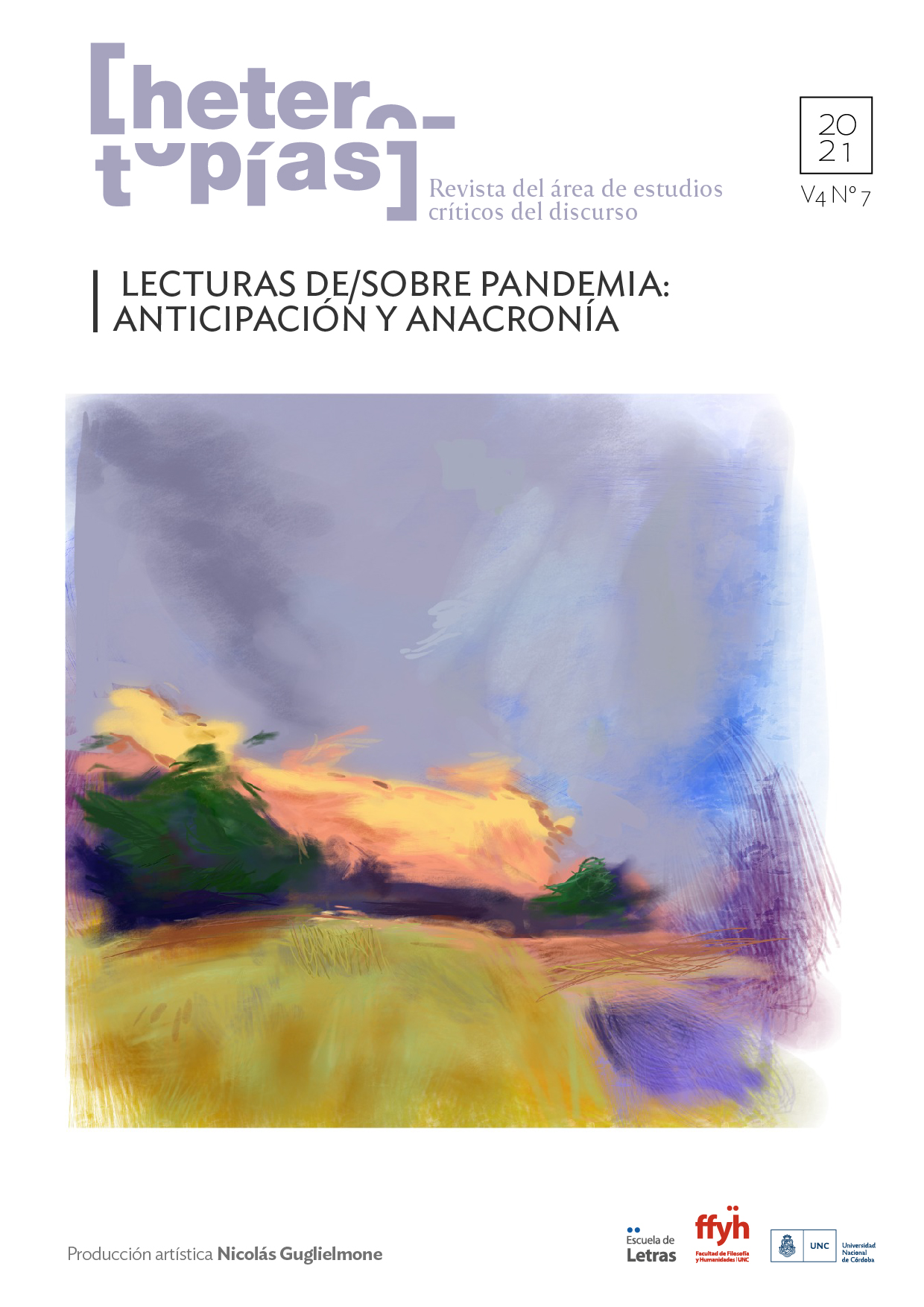Methodological considerations for the study of devices in the field of mental health
Main Article Content
Abstract
In this paper we work on the problem of the methodological approach in the study of devices in the field of mental health. For this, elements of Foucauldian reading are recovered in order to build a conceptual reference. In this way, a conceptualization of the devices is delimited in terms of heterogeneous sets of elements that belong to both the discursive and the non-discursive. Regarding the discursive, understood as a controversial concept, a differential analysis is made between the Foucauldian perspective and some structuralist and personalist readings of his time, such as Benveniste's linguistics. In a second instance, a series of methodological considerations are analyzed to address the statements and visibilities, and we proceed to locate some particularities of the field of mental health as a specific territory of our research.
It is concluded, in the first place, that conceiving the heterogeneous nature between the enunciable and the visible as two constitutive forms of the devices entails a position regarding the problem of truth under investigation. Consequently, the need to question the procedures by which a statement, a discourse, a practice or a knowledge are constituted as truths in a determined historical formation is established. Second, it concludes in the elaboration of a series of criteria that contribute to the problematization of the objectivity-subjectivity and reality-distortion dualisms. Finally, emphasis is placed on the ethical dimension of the approach to the field of mental health and particularly the option for public health. Likewise, the political dimension is highlighted, which lies in the importance of considering the ways in which power relations between people are settled. Research on these relationships of forces aims to contribute to current debates in the field of mental health.
Keywords: device; mental health; methodology; power; knowledge.
Downloads
Article Details

This work is licensed under a Creative Commons Attribution-NonCommercial-ShareAlike 4.0 International License.
Those authors who have publications with this journal, accept the following terms: Those authors who have publications with this journal, accept the following terms:
a. The authors will keep their copyright and guarantee to the journal the right of first publication of their work, which will be simultaneously subject to the Creative Commons Attribution - Non-Commercial - Share Alike (by-nc-sa) Attribution License; no commercial use of the original work or any derivative works is allowed, the distribution of which must be done with a license equal to the one that regulates the original work.
b. Authors may adopt other non-exclusive license agreements for the distribution of the published version of the work (e.g., deposit it in an institutional telematic archive or publish it in a monographic volume) provided that the initial publication in this journal is indicated.
c. Authors are allowed and recommended to disseminate their work through the Internet (e.g. in institutional telematic archives or on their website) before and during the submission process, which may lead to interesting exchanges and increase the number of citations of the published work. (See The effect of open access).
References
Benveniste, E. (1997). Problemas de lingüística general. Tomo I. México: Siglo XXI.
Benveniste, E. (1999). Problemas de lingüística general. Tomo II. México: Siglo XXI.
Bersi, A. y Melnistzky, R. G. (25 de octubre de 2019). Conversando con Alicia Stolkiner. Entrevista realizada para Revista Diagnosis, 2, (16). Recuperado de http://www.revistadiagnosis.org.ar/index.php/diagnosis/article/view/250
Deleuze, G. (2013). El saber. Curso sobre Foucault. Tomo I. Buenos Aires, Argentina: Cactus.
Deleuze, G. (2015). Foucault. Buenos Aires, Argentina: Paidós.
Foucault, M. (1968). Las palabras y las cosas. México: Siglo XXI.
Foucault, M. (1978). El juego de Michel Foucault. Revista Diwan, 2, pp. 171-202. Recuperado de http://bit.ly/eljuegoFoucault
Foucault, M. (1979). La arqueología del saber. México: Siglo XXI.
Foucault, M. (1998). ¿Qué es un autor? Córdoba, Argentina: Litoral.
Foucault, M. (1999). Raymond Roussel. México: Siglo XXI.
Foucault, M. (2002). Vigilar y castigar. Buenos Aires, Argentina: Siglo XXI
Foucault, M. (2005). El orden del discurso. Buenos Aires, Argentina: Tusquets.
Foucault, M. (2007). Historia de la Sexualidad: la voluntad de saber. Buenos Aires, Argentina: Siglo XXI.
Foucault, M. (2014). Nietzsche, la genealogía, la historia. Valencia, España: Pre-textos.
Foucault, M. (2019). Microfísica del poder. Buenos Aires, Argentina. Siglo XXI.
Guber, R. (2001). El investigador en el campo. En La etnografía. Método, campo y reflexividad. Buenos Aires, Argentina: Grupo Editorial Norma.
Pecheny, M. (2017). Introducción. En Esperar y hacer esperar: escenas y experiencias en salud, dinero y amor. Recuperado de http://bit.ly/esperarPecheny
Pérez, E. A. (2012). Los Psicólogos en el ámbito público: ayer y hoy. Salud – Desarrollo Social. Seguridad y Justicia (S026). La Plata: SECYT UNLP.
Pérez, E. A. (2015). Ejercicio de derechos y producciones de subjetividad. Un estudio en redes intersectoriales en instituciones de La Plata y Gran La Plata (2016-2018). Proyecto I+D. Acreditado por la SECYT, UNLP. Res. N°218/16.
Pérez, E. A. (2018). Ejercicio de derechos y producciones de subjetividad. Un estudio en redes intersectoriales en instituciones de La Plata y Gran La Plata. (Segunda etapa). Proyecto I+D (11/S056). Acreditado por la Secretaría de Ciencia y técnica, UNLP.
Ley Nacional de Salud Mental nº26.657, República Argentina (2010). Recuperado de http://servicios.infoleg.gob.ar/infolegInternet/anexos/175000-179999/175977/norma.htm
Revel, J. (2009). Diccionario Foucault. Buenos Aires, Argentina: Nueva visión.
Roussel, R. (1990). Impresiones de África. Madrid, España: Ediciones Siruela.
Salum, J. y Pérez, E. (2019). Ley nacional de salud mental 26.657: dispositivos de intervención que implementan las y los psicólogas/os en instituciones públicas de salud mental de la ciudad de La Plata. Investigación Joven, 6, p. 225.
Salum, J., D´Agostino, A. y Stolkiner, A. (2021). La noción de dispositivo en el campo de la Salud Mental. Inédito.
Stolkiner, A. (2015). Salud mental: avances y contradicciones de su integración a la salud comunitaria. En Qué hacer en salud-Fundamentos políticos para la soberanía sanitaria (pp. 57-70). Buenos Aires, Argentina: Ed. Colihue.
Ynoub, R. C. (2014). Cuestión de Método. Aportes para una metodología crítica. Tomo 1. México: Cengage Learning Editores.
